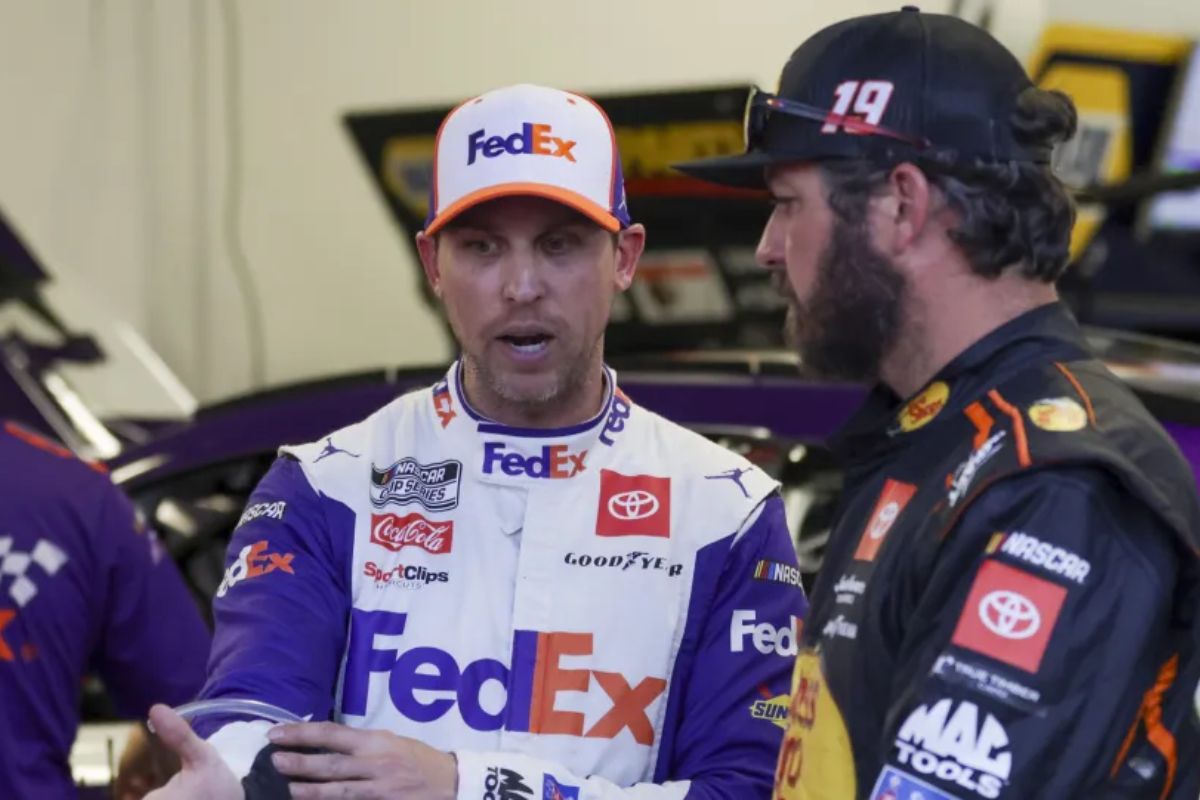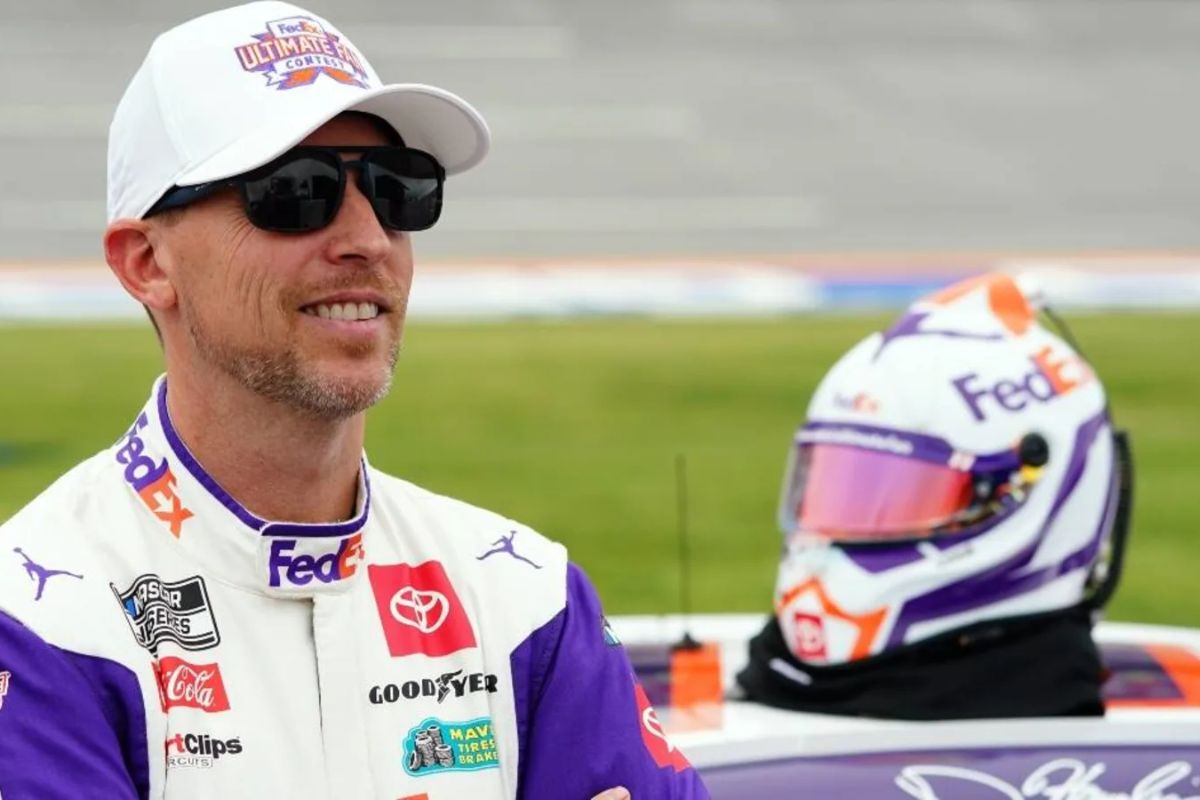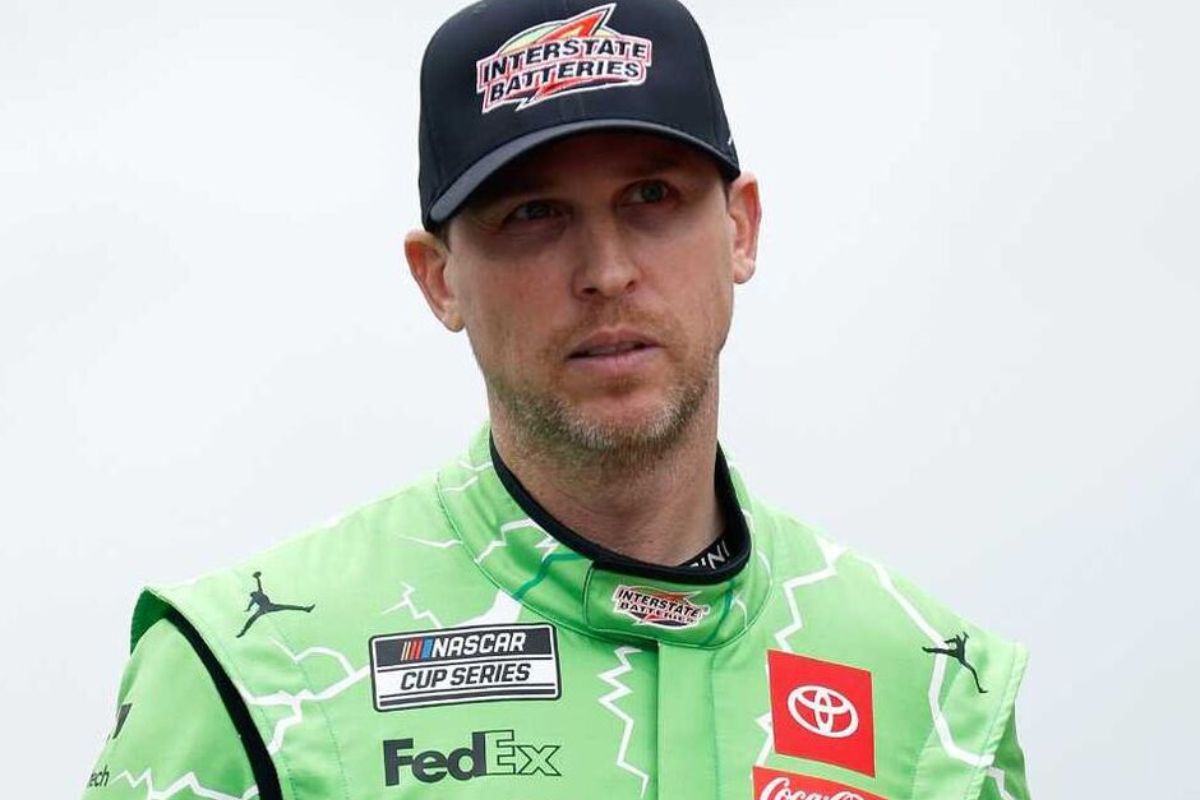Denny Hamlin Takes a Dig at Martin Truex Jr.: In the recent NASCAR event at Kansas, Denny Hamlin‘s pointed critique of teammate Martin Truex Jr.‘s decision to change four tires—contrary to the dominant two-tire strategy—brings into sharp relief the subtle strategic divides that can emerge even within a single team. Hamlin’s comments not only highlight a potential rift in Joe Gibbs Racing‘s unified front but also emphasize the critical importance of split-second decision-making in motorsport. This incident offers an intriguing view into the high-pressure decisions that define race outcomes and the interpersonal dynamics they can influence within teams. With the stakes so palpably high, one is compelled to contemplate how such strategic disagreements might shape future races and relationships within the team.
Key Takeaways
- Denny Hamlin criticized Martin Truex Jr.’s decision to take four tires at Kansas, questioning its effectiveness.
- Hamlin highlighted the importance of track position over tire strategy in his critique.
- The critique reflects underlying tensions within Joe Gibbs Racing regarding race strategies.
- Miscommunication about Hamlin’s fuel status influenced Truex’s strategic decisions during the race.
- Hamlin’s comments underscore the critical role of communication and strategy alignment in NASCAR.
Denny Hamlin Takes a Dig at Martin Truex Jr. After Kansas Slip-Up
Denny Hamlin critiqued Martin Truex Jr.’s strategic choices following an important late caution at Kansas, highlighting a significant moment of tension between the Joe Gibbs Racing teammates. Hamlin, asserting his perspective based on his own track record and experience at Kansas, suggested that Truex’s decision to opt for four tires during the final restart might not have been the most correct choice given the race circumstances and the behavior of other competitors.
Hamlin pointed out that the tactical gamble Truex took did not align with the common strategy adopted by the majority of the field. While Truex anticipated an advantage from his fresher tires, the reality of the track conditions and the race’s progression did not support this expectation. Hamlin argued that Truex’s strategy assumed a scenario that was less likely to occur, given the patterns observed in tire wear and the race dynamics throughout the day.
Furthermore, Hamlin emphasized that his own success and the faster car he possessed that day demonstrated a different approach, focusing more on track position and less on tire strategy. He subtly implied that understanding the delicate balance between when to seek mechanical grip and when to prioritize track position could have served Truex better, especially in a race environment where split-second decisions have outsized impacts.
The critique from Hamlin not only sheds light on the internal dynamics within Joe Gibbs Racing but also highlights the complexities of NASCAR strategy, where a single decision can significantly reshape the outcome of a race.
Miscommunication About Fuel Strategy
Miscommunication regarding fuel strategy added another layer of complexity to the race, as Martin Truex Jr. operated under the incorrect belief that Denny Hamlin was at risk of running out of fuel. The misinformation had a notable impact on Truex Jr.’s race approach, manifesting a defensive strategy rather than an aggressive pursuit that might have changed the outcome.
“He [Denny Hamlin] was obviously going to run out of fuel from what they told me, I don’t know, but, they said he couldn’t make it, so I don’t know what uh, yeah, easily was gonna pass him, but uh, it doesn’t matter because it gotcha came out.”-(martin)
This incident highlights a broader issue within NASCAR teams: the critical role of communication and its influence on strategic decisions. Truex Jr.’s team, based on their calculations or miscommunications from spotters, wrongly assumed Hamlin’s fuel levels were critically low, which dictated their race tactics.
“If there was no caution, I could have caught them quickly.”-(truex jr.)
Moreover, Hamlin’s confidence in his fuel strategy, as he later discussed on his podcast, illustrates the sophistication and precision of modern racing logistics. Teams must constantly calculate and recalculate fuel strategies against multiple variables including race pace, caution periods, and competitor positions.
This scenario serves as a case study on the importance of accurate, timely information and communication within racing teams. As the stakes are high, the ability to swiftly adapt strategies based on reliable data is indispensable. Miscommunications such as these not only affect the outcome of a single race but could influence championship standings, highlighting the necessity for mastery in logistical coordination and strategic communication.
Hamlin’s Confidence and Performance
Denny Hamlin’s confident showing at Kansas, highlighted by a win in Stage 1 and a solid finish despite pit road challenges, emphasizes his assurance and strategic skill in the midst of fierce competition. Starting from a modest 14th position, Hamlin’s ascent was marked by decisive overtaking and robust defense, highlighting his adeptness at maneuvering the dynamic race environment. His victory in the initial stage set a tone of dominance, which he sustained through strategic pit stops and adept track positioning.
Hamlin’s performance was particularly notable during the intense exchanges and the tactical execution on pit road. Despite being momentarily hindered by Austin Hill and his crew, Hamlin showcased a commendable level of resilience and tactical clarity. This ability to maintain composure and focus under stress is indicative of a seasoned racer who not only anticipates the demands of the race but also adeptly counters them.
“I didn’t have any awareness that the 19 was coming and he didn’t pick up the pace. We just slowed down the pace so much that we, we came back to him. I felt very confident that I could have just hit the gas and gone, Chris said. […] Chris told me, he says, yeah, I was just about to tell you on the radio, go ahead and go the nineteen’s there. And I would’ve said, okay, I’ll hit the gas stop.” -(hamlin)
“It would’ve been close. I don’t know what to tell you. I just felt like if we go out on all-out speed, I’d pass Martin three times that day.” -(hamlin)
The race also brought to light Hamlin’s competitive spirit and his psychological edge in racing. His remarks regarding Truex Jr.—asserting superiority in speed and the ability to outperform him consistently through the race—reflect not just a racer’s bravado but a calculated psychological play. By affirming his superior performance and downplaying Truex’s chances, Hamlin not only positions himself as a contender but also subtly undermines the confidence of his competitors.
This blend of psychological savvy, strategic execution, and driving skill highlights why Hamlin remains a significant figure in NASCAR racing. His performance at Kansas is a demonstration of his ability to blend speed, strategy, and mental agility to maintain a competitive edge in the high-stakes environment of professional racing.
Hamlin’s Championship Aspirations
Confidence flows every aspect of Denny Hamlin’s racing persona, particularly as he boldly articulates his ambitions for clinching his inaugural NASCAR Cup Series Championship in the upcoming season. His recent declarations not only highlight a self-assured mindset but also reflect a strategic vision that has been carefully honed over years of competition. The precision with which Hamlin targets his victories – excluding only the road courses from his ambitious win tally for the season – implies a deep understanding of his strengths and the dynamics of his No. 11 Toyota Camry team.
“This is it. This is the year. This is the year it’s going to happen,”-(hamlin)
Analyzing Hamlin’s assertive championship claims requires recognizing the psychological warfare often present in top-tier sports. By publicly setting such high targets, Hamlin not only elevates his team’s morale but also imposes a psychological weight on his competitors.
Furthermore, Hamlin’s specific exclusion of road courses from his victory predictions acknowledges his self-awareness about his performance spectrum. This insight into his own racing profile is essential for setting realistic goals while still pushing the limits of his team’s capabilities.
In essence, Hamlin’s championship aspirations are not mere expressions of hope but appear to be grounded in a robust strategy that utilizes his strengths, acknowledges his limitations, and psyches out his competitors. The upcoming season will reveal whether this blend of confidence and calculated focus can eventually secure him the coveted title.
Hamlin’s Quest for the Championship
Despite a career adorned with significant victories, the NASCAR Cup Series Championship continues to be problematic for Hamlin, adding an emotional layer to his ongoing pursuit. Denny Hamlin, a seasoned veteran in NASCAR, displays a resume bursting with 54 Cup Series wins, including the coveted Daytona 500 victory thrice. Yet, the ultimate award, the Cup Series Championship, remains just beyond his grasp.
“Probably 22 of the next 25, I’m taking out the road courses. Other than that, that’s all I’m taking out.”-(hamlin)
Analyzing Hamlin’s 2024 season, his performance is marked by consistency and strategic brilliance. Winning three of the first twelve races and maintaining a presence at the front in every race highlights his skill and resolve. This year might be seen as a critical juncture in Hamlin’s career trajectory. The intensity of his drive is evident, perhaps fueled by the narrowing window for securing his first championship title.
Hamlin’s approach this season reflects a refined strategy, focusing on accumulating points steadily rather than risky tactics that could compromise his standings. His ability to lead laps in every race demonstrates not just speed but smart race management, a crucial quality for a championship contender.
Moreover, Hamlin’s experience plays a vital role in high-pressure situations, a frequent scenario towards the season’s climax. His deep understanding of race dynamics and competitor psychology gives him an edge, potentially decisive in outmaneuvering younger talents and seasoned rivals alike.
As the season progresses, it will be essential to monitor Hamlin’s performance in playoff races, where his strategic insight and resilience will be tested under extreme circumstances. The question remains: can 2024 be the year when Hamlin finally captures the championship, or will it slip through his fingers once again?
News in Brief: Denny Hamlin Takes a Dig at Martin Truex Jr.
The incident at the Kansas race highlights the crucial nature of decision-making in NASCAR, where both track position and tire strategy play significant roles.
Denny Hamlin’s critique of Martin Truex Jr. not only sheds light on the internal dynamics within Joe Gibbs Racing but also emphasizes the broader implications of strategic choices in racing.
This discussion shows how thorough considerations are vital in the pursuit of championship victories, reflecting the details of professional motorsport competitions.
Our Reader’s Queries
Q. Why did Martin Truex Jr. get suspended?
A. Martin Truex Jr. faces a suspension from the next two NASCAR Cup Series Championship events after the post-race incidents at Richmond Raceway last Sunday. Reflecting on the events, NASCAR officials expressed disappointment, noting that the sport, which hails from the “State of Lovers,” was not founded on the heated tempers witnessed during the cooldown lap.
Q. What is Denny Hamlin’s annual salary?
A. Denny Hamlin currently commands an estimated annual salary of around $13 million while driving for Joe Gibbs Racing. His commitment to the team was reaffirmed with a multiyear contract extension inked in September 2023. Renowned for his talents behind the wheel, Hamlin has remained among the elite, consistently ranking as one of the highest-paid drivers in the NASCAR circuit.
Q. Has Denny Hamlin ever won a championship?
A. Denny Hamlin confidently asserts, “This is the year,” in reference to clinching the NASCAR Cup Series Championship, as reported by Yardbarker.
ALSO READ: Denny Hamlin’s Bold Declaration: “This Is the Year” for Championship



